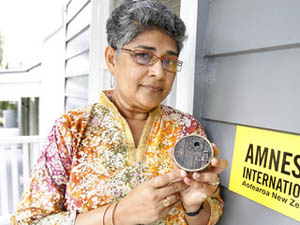
AUCKLAND: As the world’s attention focuses on the human rights revolution sweeping across the Middle East and North Africa, Amnesty International’s latest report reveals Pacific people are facing the same struggle against oppression, tyranny and corruption.
On the eve of its 50th anniversary, the organisation has launched its annual assessment of human rights worldwide, Amnesty International Report 2011: State of the World’s Human Rights, which documents abuses in 157 countries during 2010.
“Away from the international headlines, thousands of people in the Pacific are being denied social and economic opportunity, and human rights defenders have been threatened, imprisoned and tortured,” says Patrick Holmes, chief executive officer of Amnesty International Aotearoa NZ.
In Fiji, the military-led government continued to rule without a constitution, and repressive Public Emergency Regulations remained in place.
Reports on torture and attacks against freedom of expression escalated, where critics of the government, including members of the Methodist Church, were among those targeted, and a new law was passed stifling media freedom. And despite announcing new legislation to address violence against women, little was done to ensure its implementation.
In Papua New Guinea, violence against women and sorcery-related killings continued to be widespread but the government has done little to address them. Torture and ill-treatment of prisoners remained pervasive.
In the Solomon Islands, thousands of people living in informal settlements were denied access to basic services including clean water and sanitation. Violence against women persisted with government efforts to combat the issue yielding little impact.
“Similar to what we have witnessed through the protests spreading across the Middle East and North Africa, not only are Pacific people facing torture and the denial of freedom of expression, but also social and economic injustice by long-standing repressive governments,” says Holmes.
“People from both the Pacific and the Middle East are rejecting the notion that they have to choose between rights or development – they want to live free from fear and free from want.”
Amnesty International is calling on Pacific governments to do more to meet the legitimate aspirations of their people, and to deliver a degree of accountability and transparency. But as activists in the Middle East have shown, human rights gains are not "granted" by governments, but demanded and seized by the people.
“In the 50 years since Amnesty International was born to protect the rights of people detained for their peaceful opinions, there has been a human rights revolution. The call for justice, freedom and dignity has evolved into a global demand that grows stronger every day – and Pacific leaders must heed the message that those most affected by abuses will be the driving force behind social change,” adds Holmes.- Amnesty International/Pacific Media Watch



